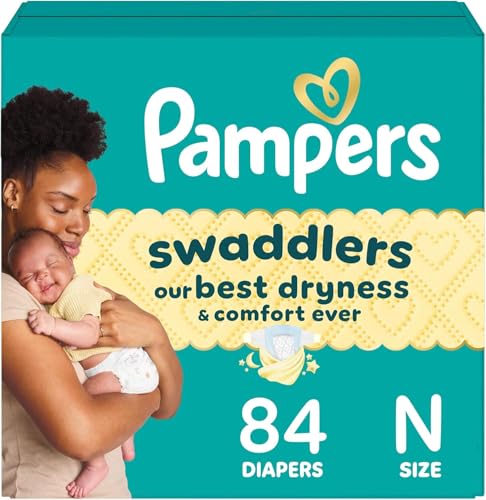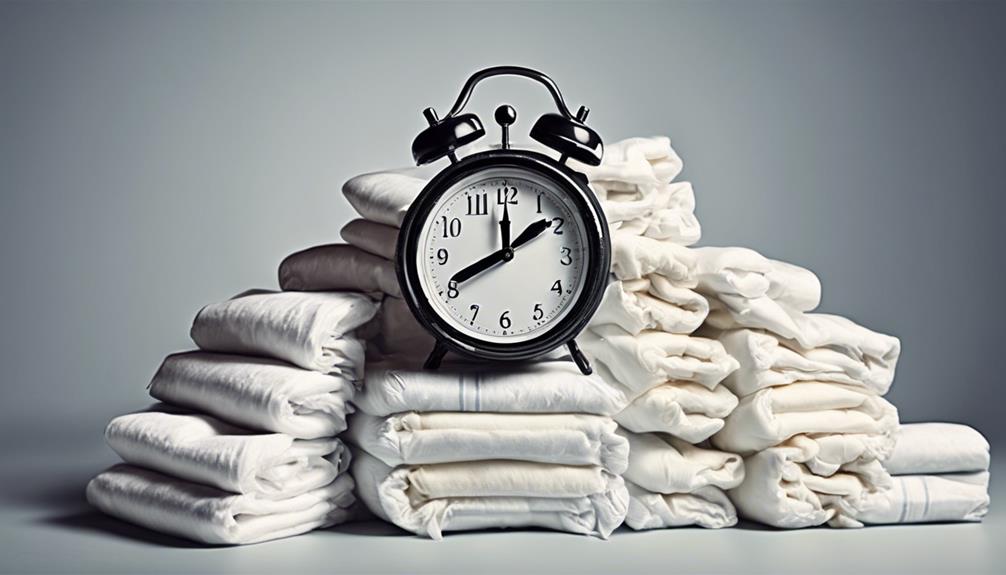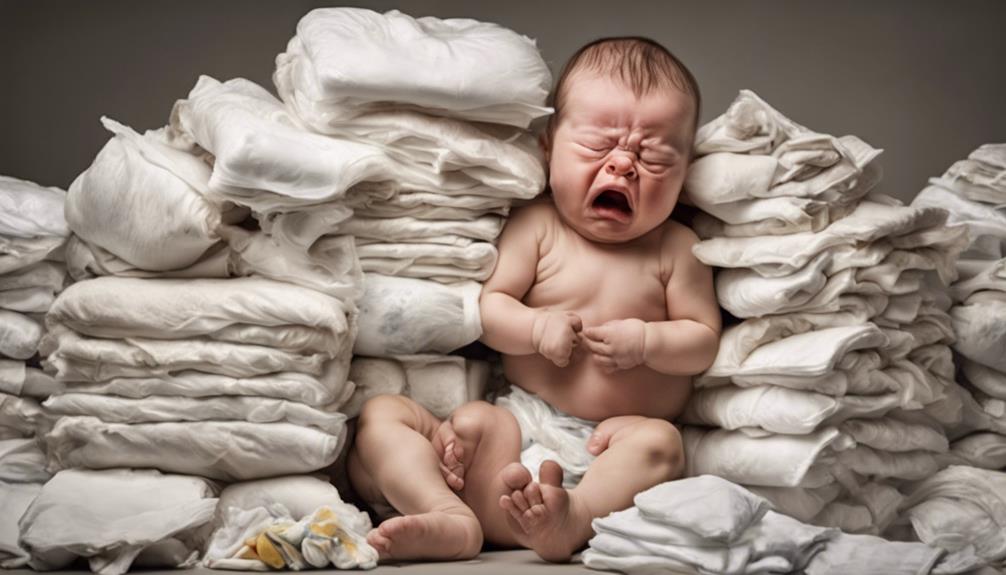As the saying goes, 'All things must pass.' When it comes to the topic of how many poop diapers a newborn uses daily, the numbers may surprise you.
Understanding the frequency and patterns of newborn bowel movements is important for caregivers. It's not just about the quantity; it's also about the quality and what it signifies about the baby's health.
So, let's start on this exploration together and uncover the ins and outs of diaper changes in those early days of parenthood.
Key Takeaways
- Newborns typically use 5-6 poop diapers daily to reflect their digestive health and milk intake.
- Breastfed babies have more frequent bowel movements compared to formula-fed infants.
- Changes in poop diaper frequency can indicate feeding issues or health concerns.
- Monitoring diaper count is crucial for understanding and assessing the baby's health status.

Kopi Baby Portable Diaper Changing Pad – Baby Diaper Changer Travel Bag with Wipes Pocket, Smart Design Portable Changing Mat, Infant Travel Station Kit, Gift for Newborn Girl & Boy – Grey, Classic
PERFECTLY PORTABLE CHANGING STATION – with Kopi Baby’s diaper changing pad, you can have a clean, waterproof and…
As an affiliate, we earn on qualifying purchases.
As an affiliate, we earn on qualifying purchases.
Newborn Diaper Usage Overview
In caring for a newborn, understanding the typical diaper usage is important for monitoring their health and well-being. Newborns typically go through about 5-6 dirty diapers a day, with each diaper indicating the baby's digestive health and bowel movements.
These frequent bowel movements aren't just about getting rid of waste; they provide valuable insights into the baby's overall health, hydration levels, and whether they're receiving enough nourishment. It's essential to pay close attention to the number of dirty diapers a day, as changes in frequency can sometimes signal issues such as constipation or digestive problems that may require attention.
Breastfed babies tend to have more frequent bowel movements compared to formula-fed babies, as breast milk is easily digested, leading to more stool production. Monitoring and keeping track of your baby's dirty diapers in the first few days and weeks can help you understand what's normal for your little one and quickly identify any deviations that may warrant a discussion with your pediatrician.

Pampers Swaddlers Diapers, Size 0 (up to 10 lbs), 84 Count, Absorbent, Keeps Baby Dry and Comfortable, Skin Safe Disposable Baby Diaper (Packaging May Vary)
OUR BEST DRYNESS & COMFORT EVER: Pampers Swaddlers keep baby dry and are irresistibly soft to keep baby…
As an affiliate, we earn on qualifying purchases.
As an affiliate, we earn on qualifying purchases.
Factors Affecting Daily Diaper Count

Shifting from the discussion on newborn diaper usage, we explore the various factors that influence the daily count of poop diapers in newborns. When considering the frequency of diaper changes in newborns, several factors come into play:
- Breastfed Babies: Breastfed infants tend to have more frequent dirty diapers due to the easily digestible nature of breast milk.
- Hydration Levels: Adequate hydration is essential for healthy bowel movements, affecting the number of poop diapers a newborn may have.
- Digestive Maturity: The digestive system of newborns develops at different rates, influencing how often they pass stools.
- Health Issues: Changes in poop diaper frequency can indicate health concerns, emphasizing the importance of monitoring bowel movements for early detection of problems.
Understanding these factors can help parents and caregivers gauge the importance of their newborn's poop frequency and seek guidance from healthcare providers when needed. Monitoring diaper changes isn't just about cleanliness; it's a crucial aspect of newborn care that provides insight into their overall health and well-being.

ALVABABY Newborn Cloth Diapers Pocket for Less Than 12pounds Cloth Diaper 6pcs with 12 Insert 6SVB03
FASION & STYLISH -Why not get these reusable, washable super-absorbent and comfortable cloth nappies / diapers, which are…
As an affiliate, we earn on qualifying purchases.
As an affiliate, we earn on qualifying purchases.
Typical Poop Diapers per Day
During the first weeks of life, newborns typically go through 5-6 poop diapers daily, serving as indicators of their digestive health and milk intake. Babies, especially breastfed ones, tend to have more frequent bowel movements in their first days, with some going through up to 6 or more dirty diapers daily.
On the other hand, formula-fed babies generally have slightly fewer poop diapers, averaging around 1-4 bowel movements a day. It's important for parents to monitor the number of poop diapers their baby has as it can provide valuable insights into the baby's digestive system and overall well-being. Changes in the frequency of baby poops can signal feeding issues or health concerns, making it essential to consult with a pediatrician when necessary.
Understanding the typical poop diaper count for a new baby helps parents feel more confident in managing their baby's bowel movements and health.

5PCS Diaper Bag Organizer Pouch Set,TSA Approved Toiletry Bag, Waterproof TPU Makeup Bag Set, Travel Organizer Bags for Women and Kids
Advanced Material:Our factory uses upgraded colored leather material. Each edge has been reinforced to make the entire storage…
As an affiliate, we earn on qualifying purchases.
As an affiliate, we earn on qualifying purchases.
Warning Signs to Watch For

As parents navigate their newborn's daily care routine, it's important to remain vigilant for warning signs that may indicate potential health concerns. Monitoring your newborn's hydration levels and diaper output is critical for their well-being. Here are some key signs to watch for:
- Decreased Wet Diapers: Keep an eye out for fewer than 5-6 wet diapers per day in newborns, as this could signal dehydration or feeding issues.
- Weight Loss: Be alert to weight loss in newborns along with decreased wet diapers, as it may indicate a health concern that requires medical attention.
- Changes in Diaper Output: Track your newborn's wet diapers to ensure proper hydration and overall health, as alterations in diaper output can be indicative of underlying health issues.
- Seeking Medical Advice: If the number of wet diapers decreases significantly, it's important to seek medical advice promptly, as it could be a sign of an underlying health problem affecting hydration levels.
Being proactive and observant of these signs can help you address any potential issues early on and guarantee your newborn's health and well-being.
Tips for Managing Diaper Changes
To confirm a smooth and comfortable diaper changing experience for your newborn, establishing a consistent routine can be beneficial for both you and your baby. Newborns typically require 8-10 diaper changes daily, especially during the first few weeks when bowel movements are frequent due to their digestion process.
Promptly changing diapers is vital to prevent diaper rash and guarantee your baby's comfort. By monitoring wet and dirty diapers, you can track your baby's hydration levels and feeding patterns, aiding in their overall well-being.
Developing a diaper changing routine not only promotes cleanliness and hygiene but also provides a sense of predictability for both you and your little one. Remember to use gentle wipes and diaper creams to protect your baby's delicate skin during changes.
Maintaining a clean and organized diaper changing area can also streamline the process and make it more efficient. By prioritizing proper diaper usage and hygiene, you can enhance the diaper changing experience for you and your newborn.
Frequently Asked Questions
How Many Diapers Do You Need for a Newborn Poopy?
We typically need around 5-6 poop diapers per day for a newborn. It's important to monitor this to guarantee their health and digestion. Breastfed babies may have more poopy diapers. Lack of poopy diapers could signal issues.
How Many Pee and Poop Diapers Should a Newborn Have a Day?
We guarantee a healthy newborn by monitoring 5-6 wet diapers daily for hydration. Breastfed babies often have 3-4 yellow, seedy poop diapers, while formula-fed may have 1-2 brown, paste-like ones. Notify healthcare providers of any changes for guidance.
How Often Should a Newborn Poop Chart?
As parents, we comprehend the concerns about newborn poop frequency. It varies; breastfed babies can go multiple times a day, while formula-fed babies may go less often. Trust your instincts, but any sudden changes should be discussed with a pediatrician promptly.
How Often Should a Newborn Poop Breastfed?
When breastfeeding, newborns usually poop after each feeding session, totaling around 5-6 poops daily initially. It's fascinating how their tiny digestive systems work! Monitoring these poops helps make sure they're well-fed and hydrated.
Conclusion
In summary, keeping track of your newborn's diaper usage is vital for their health and well-being. By monitoring their poop diapers daily, you can make sure they're getting the necessary nourishment and hydration. Remember, frequent diaper changes and paying attention to any warning signs can help you address potential issues early on.
Stay vigilant and consult with a pediatrician if you have any concerns. Your baby's poop can tell you a lot about their health!









